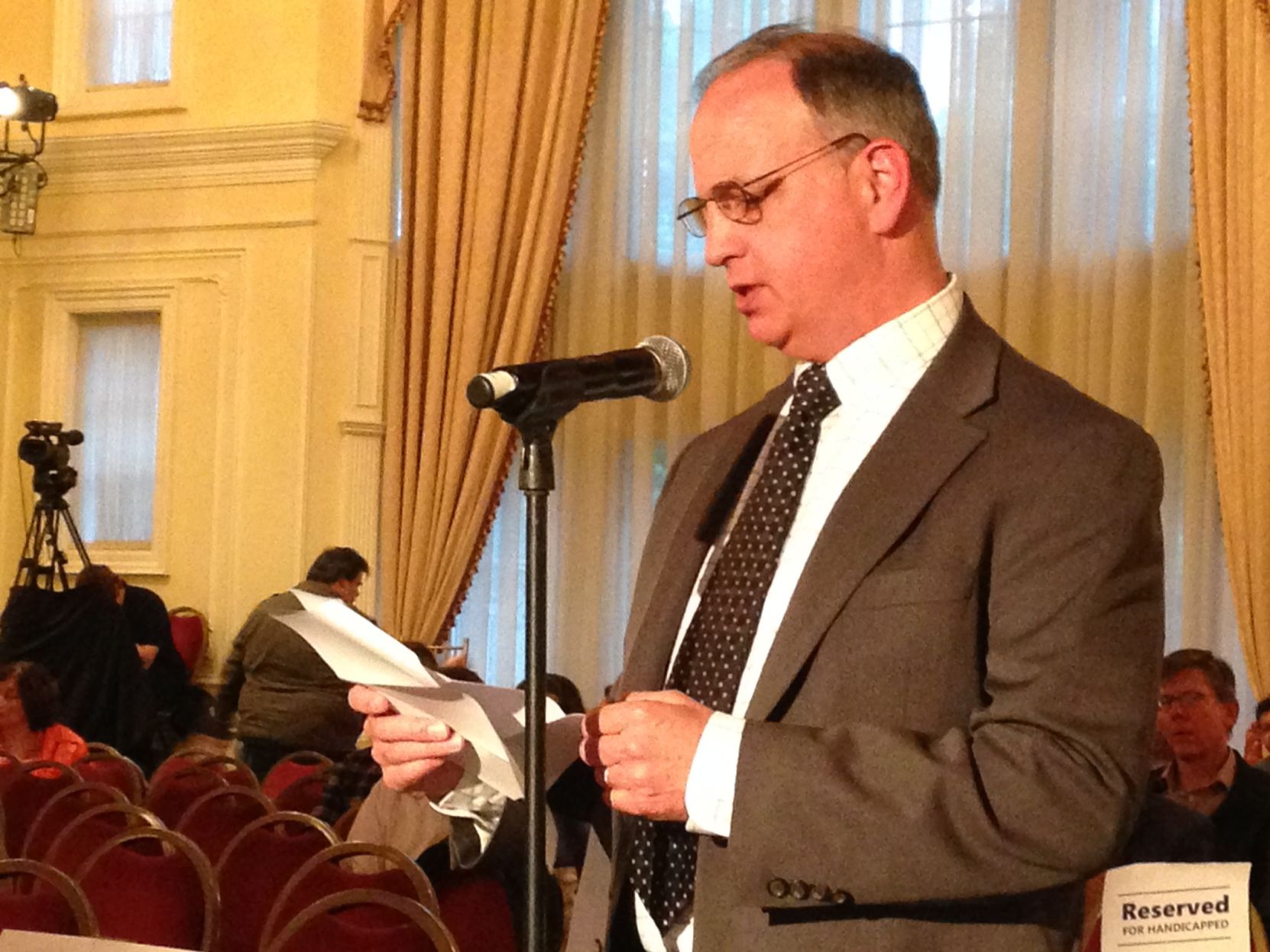State and Long Island Rail Road officials heard concerns about their plans for a third track directly from residents at the first four of six public scoping meetings on Tuesday.
While the concerns more than three dozen people who spoke against the proposal to add a track to the LIRR’s Main Line between Floral Park and Hicksville are set to be studied in an environmental review, many said the $1.5 billion would be better spent on eliminating street-level railroad crossings rather than a third track.
“These are safety measures few can argue against,” former Village of Floral Park Mayor Ann Corbett said at the Inn at New Hyde Park Tuesday evening.
Officials held meetings in New Hyde Park, Uniondale, Westbury and Hicksville Tuesday and Wednesday to hear public suggestions for additions to the scoping document released May 5 that outlines an environmental study and details plans for eliminating the corridor’s seven street-level crossings.
In addition to delivering public comments, residents could ask planners questions in a separate room, submit written comments and dictate comments privately to a stenographer. The comment period is open until June 13.
Most concerns village officials and residents living near the tracks voiced about additional train noise, vibrations, soil contamination, and businesses and construction impacts will be addressed in the environmental review, the draft scope says. Some asked about screening to protect from flying debris and service impacts on the LIRR’s Hempstead Line, which the scope does not directly mention.
But opponents also questioned the LIRR’s rationale for the project, saying train service could not improve much from the railroad’s 95-percent on-time rate. Several said they think the project will primarily serve to increase freight train traffic, which they say poses a danger to their health and quality of life.
“This isn’t about commuters. This is about freight, and you are going to take away the livelihood from many homeowners along this track line so that you can make a couple of large businesspeople, who already have enough money in their pocket, happy,” Floral Park civic activist Matthew Sexton said.
In an interview, LIRR President Patrick Nowakowski said planners see no evidence of an increase in freight use based on industry demand.
Federal law requires the LIRR to let freight trains use its tracks, he said, but the project’s goal is to run more passenger trains east and west during peak commute hours, when the railroad does not allow freight travel.
“I can’t generate freight business,” Nowakowski said. “Businesses need to generate freight business, so this will do nothing to generate more freight.”
While they said opponents’ worries are legitimate, proponents, including business and labor leaders and a few Main Line residents, touted the third track’s potential economic benefits.
Many called the project “vital” to Long Island’s economy, as many young people are leaving to avoid long LIRR commutes to New York City. Better train service would also attract workers to the growing health-care and technology industries, they said.
“There is a growing perception that it’s difficult to get off and on Long Island, and the direct result is a critical drain of talent and resources,” YMCA of Long Island CEO Anne Brigis said.
Opponents, including Floral Park Village Justice Douglas Hayden, said people are leaving Long Island because of “high taxes and poor quality of life,” not long commutes.
The third track’s negative effects on local businesses could outweigh any regional economic benefits, Floral Park Trustee Lynn Pombonyo said.
“We are all interested in improving the economy of greater Long Island,” she said. “In doing so, we do not want to put the villages and small municipalities who are along the path of the third track in danger of damaging their local economies forever.”
As mayors of eight villages along the corridor have said, Floral Park Village Administrator Gerry Bambrick told planners Tuesday the LIRR should implement fixes to its existing infrastructure before building a third track, such as upgrading switches and electrifying tracks further east.
The Main Line needs a third track to complement other LIRR projects that are increasing the railroad’s capacity, such as East Side Access, improvements at Jamaica Center in Queens and a second track into Ronkonkoma, Nowakowski said.
The project could entail more train stops along the Main Line if there is a proven demand for them, he said.
“I can’t increase service on both sides and not the most important piece in the middle,” Nowakowski said. “So I need to do all these projects, not just those that are not in this corridor.”
As they did last week, opponents voiced skepticism of the LIRR’s ability to fulfill its promises to install the third track entirely on its own property and avoid residential property takings, steps Gov. Andrew Cuomo has taken to distinguish his plan from the Metropolitan Transportation Authority’s more invasive 2005 proposal.
Opponents also charged the MTA has rushed the scoping process and has lacked transparency, and continued calls for Cuomo to release specifics about where the track will go, where construction will be staged and other details.
“It’s almost like (Cuomo) wants us to marry a mail-order bride that we’ve never even seen,” said Bill Corbett of Floral Park, leader of the opposition coalition Citizens Against Rail Expansion.
Those details will be in the environmental study, the scoping document says. Planners will hold more public meetings and solicit more comments after it releases the study later this year.
The scoping meetings and public comment period are beyond what is required under state environmental review law, state officials have said.
“Keep coming to these meetings, pay attention, give us the feedback,” Nowakowski said. “That’s what we’ve committed to do, and that’s what we intend to do.”
The public can submit comments on the third track project through its website, www.amodernli.com, via email or at the project information center at the Mineola LIRR station, open Tuesday through Saturday.



